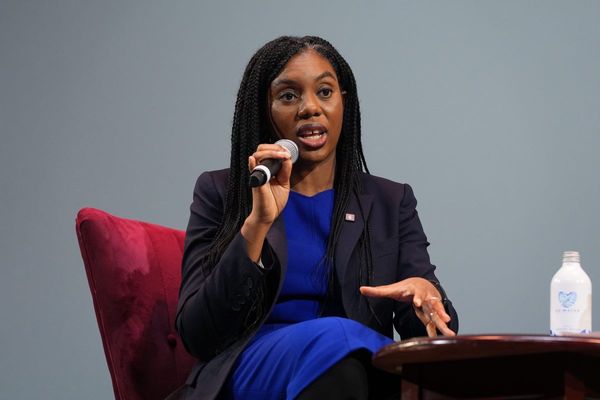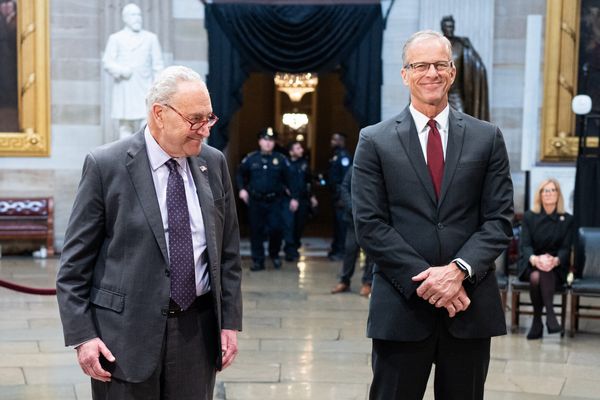
Slowly the gun carriage went up St James’ Street, watched by 10,000 wet eyes. Men fainted, men burst out crying; from where I stood I watched them being helped, and sometimes carried, into an emergency relief station below me on the pavement by Marlborough House. After the gun carriage disappeared came the queen’s coach, magnificent in its red trappings. She sat at the window all in black … the queen looked incredibly magnificent, and composed.
Chips Channon, diary, January 28 1936, Funeral of George V
LP Hartley’s famous line that “the past is a foreign country” was always of uncertain application in Britain. Tony Blair once observed that he loved Britain’s history but didn’t want to live in it, suggesting that the past lived and breathed, perhaps too robustly, in the present.
And at no time more so than in yesterday’s funeral for the queen.
If some details had a decidedly modern touch — the presence of world leaders, and of Commonwealth prime ministers, enabled by air travel; Vaughan Williams on the hymn list; the relocation to Westminster Abbey from Windsor — most of the ritual of the event was straight from the multiple royal funerals of the first half of the 20th century, when successive male monarchs came and went, sandwiched between two mighty female reigns. Chips Channon would have bitched about Harry, lamented the appearance of some of the peers of the realm, derided Keir Starmer, and felt perfectly at home. Hell Saint-Simon would have as well, after recovering from seeing a French president rather than a king.
Unlike the ultimate reality TV show that is a royal wedding, the ritual and ceremony of royal funerals is inexplicable to outsiders. The pageantry of a wedding can be dismissed as “fairytale”; there’s no need to explain any of it, but the details of yesterday’s event would have made no sense even to many Britons, let alone Australians. Why the gun carriage? Why are Royal Navy servicemen and women drawing it? What’s on the coffin? Why the archbishop of Canterbury?
Overlooked is the fact that the monarch is the head of the Church of England; her death is a supremely Anglican moment; Charles can talk of diversity of values and allowing different faiths to prosper, but nothing changes that the sovereign is innately, fundamentally, a religious figure, in a society that’s about as irreligious as they come. The struggles of the Reformation and the political events of the 16th century, long forgotten in other countries, live on in the perpetual body of the sovereign. In the supreme head of the Church of England King Charles III, the past is not merely not a foreign country, it’s not even the past.
The strangeness of this radical intrusion of the five centuries of history into 2022 is doubled, tripled, watching from Australia, a country lacking an established religion, or a rigid social hierarchy — we hand out suffixes for people, peculiarly based on merit, rather than their birth — or its own extended white history. The closest we get are state funerals and memorial services, inevitably lacking in even perfunctory ritual and certainly no pomp. Pomp gets you mocked in this country, unless it involves military uniforms, in which case slavish respect is demanded, and received.
What we do have is an ancient history, 60,000 years’ worth, far longer than that available to Europeans, a culture that lives on not through the giant theme parks of history — castles, cathedrals, abbeys — but through the people who have survived invasion and dispossession. But it’s one we’ve turned our backs on, without even the simplest recognition of our First Peoples in our institutions or constitution, leaving us bereft.
The republican debate must inevitably address that absence; monarchists seek to channel the past, to continue to import another country’s increasingly alien rituals and history, along with the religion that inevitably accompanies it. They understand, probably better than many republicans, that people need a past, even if they don’t want to live in it.
The first step is thus to acknowledge our own, deep past, and its continuing existence, recognising our First Peoples and their experience. The alternative is an increasingly incomprehensible past beamed in from Westminster Abbey.
Is it time Australia embraced its own past rather than England’s? Let us know your thoughts by writing to letters@crikey.com.au. Please include your full name to be considered for publication. We reserve the right to edit for length and clarity.







